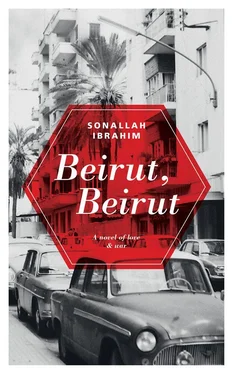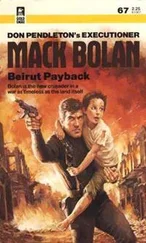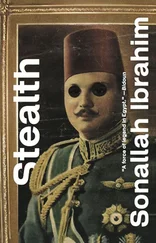A tall young man in pants and a sweater opened the door. A beaming smile lit up his face at the sight of us. We walked inside to a clean living room with a metal table and several chairs. At the far end was a desk with bookshelves above it.
He gestured for us to sit, then slowly took a step, moving one of his legs with difficulty. He took a chair facing us. He observed me silently without letting the smile disappear from his face. It was a handsome face, with sharp features, and filled with lines belied by the luxuriant black hair. A lock of it hung down over his brow, and there was a strange expression in his eyes, the significance of which I couldn’t make out.
Silence settled over us and I lit a cigarette. Antoinette did the same. Finally, I forced a smile and asked her, “Aren’t you going to introduce me to your friend?”
“Walid is Palestinian, originally from Jaffa. He is an art teacher at the camp school. He also does translating for the media institute.”
After a moment, she added: “I talked to him about you. He is happy to meet you.”
I looked at both of them in confusion. I noticed that he didn’t take his eyes off her lips.
“He can’t hear or speak,” she said in a trembling voice.
I looked at him, and he exchanged looks with me. I got the feeling he understood what she had said.
“What do you want to drink?” she asked me. “I don’t think we’ll find alcohol here.”
“I don’t want anything to drink,” I said quickly.
“I want some coffee,” she said. “Should I make one for you, too?”
“Sure.”
She walked to a door at the side of the room. I could see a gas cylinder through it. I looked up at the walls, and began scrutinizing the posters all over them. Among them was a newspaper aimed at children, of the kind printed to be displayed on a wall. I happened to glance at Walid, and I found him watching me with a friendly smile. I realized that the strange expression reflected in his eyes was the same one we always see on people with disabilities connected to hearing and sight. It makes them seem as if they are seeing you, but thinking about something else at the same time.
Antoinette walked in on us with a tray of coffee. I reached out for a cup, and she said:
“No. That’s for Walid. He takes it with a lot of sugar.”
“Why the surprise?” I asked her, helping myself to another cup. “Why didn’t you tell me from the beginning?”
She hesitated. “I don’t know,” she replied.
Walid took two sips from his cup, then put it back on the tray. He turned toward the office, and picked up a piece of paper and a pen. He wrote several lines, then handed the paper to Antoinette.
“He welcomes you,” she said, after reading the first line.
She silently finished reading what was on the paper, then folded it and put it in her pocket. She turned to look at him.
I finished my coffee, and fidgeted in my chair. I told Antoinette that I had an appointment back at the apartment in half an hour. She stood up. “We can leave,” she said.
Walid’s expression changed. A hint of worry appeared in his eyes. Antoinette gave him an inquisitive look, so he got out of his seat. He walked, limping, to his desk and sat there. He picked up a thick Flo-master pen and a piece of white paper.
Antoinette went over and stood behind him, telling me, “One minute.”
Walid busied himself with the paper for several seconds, and then put it to one side and pulled out another one. Antoinette picked up the piece of paper, and then handed it to me.
I was looking at a drawing, the meaning of which I couldn’t make out. It was made up of several lines and black marks. I turned the paper over in my hand. Eventually I recognized the map of Palestine as it had appeared in 1948, when Zionists cut out a small part of it where they declared their state.
Walid finished the second piece of paper, and was busy with a third. Antoinette handed me the paper, and I found that it was the same map, but the black mark that looked like Israel had grown bigger and expanded, and contained the West Bank up to the River Jordan, and the Sinai Peninsula, and Syria’s Golan Heights, and the cities of Gaza and Rafah.
On the third piece of paper, arrows extended from the black mark to southern Lebanon. On the fourth, the arrows reached Beirut, Amman and Damascus. On the fifth, they extended to Baghdad, Kuwait, Dhahran in Saudi Arabia, and Benghazi.
I felt annoyed. I felt as if he was treating me like a student in his school. What he wanted to make me understand was something all Arabs “ from the Atlantic to the Gulf ” knew about. Soon my annoyance dissipated, and I saw that, on the face of things, circumstances proved just the opposite.
I folded the five pieces of paper and put them in my pocket, then I shook his hand. I left the apartment and stood waiting for Antoinette at the entrance of the building. On the wall opposite I saw a poster of a martyr. It had a bad photograph of a smiling face overflowing with youthful virility. Beneath the image was his name, and a notice that he had received academic military training, and that he was killed while dismantling an explosive charge.
Some time later, Antoinette joined me and we retraced our steps in silence to where we had left the car. As soon as we passed the barrier with the gunmen, we headed out on the road to the center of West Beirut.
“Walid’s leg was hit during the massacre that King Hussein orchestrated for the Palestinians in Jordan in 1970,” she explained. “I got to know him at the end of ’75. He was completely normal. He talked and sang and everything. After Tel Zaatar, he went silent.”
“Didn’t he go to a doctor or a hospital?” I asked her.
“Everyone who examined him agreed that his hearing and vocal apparatus aren’t damaged.”
She slowed down to avoid hitting a car that had Syrian plates and was driving in the middle of the street. She pressed the horn several times, but to no avail. In the end, she was forced to stay behind the other car.
“He leaves me the freedom to do what I want. I can leave him if I want,” she went on.
I gave her a puzzled look. Flushing red, she hastily added: “He doesn’t touch me. But I won’t leave him. I love him.”
We traveled the rest of the way in silence. I wanted to get out of the car on Hamra Street, but she insisted on bringing me to the door of the building. I stood out on the street until she left, then I crossed to a grocery on the sidewalk opposite. I bought a kilo of grapes, several pieces of cheese, some canned goods, and a few cans of beer.
The elevator was on the top floor, so I opted to take the stairs. Wadia was out, so I set my purchases on the kitchen table. I took out a can of beer from the refrigerator. I put my finger in the pop-top ring but yanked it too quickly and it twisted. A spray of beer shot out of the can and landed on my face and clothes.
I poured the contents of the can into a glass, and dried myself. Then I carried the glass to the living room, and sat down next to the telephone. I gulped down half the glass in one swig, picked up the phone and dialed.
The phone rang for a long time before her voice came to me, cold and reserved.
“It’s been two days since I’ve seen you,” I said.
“You saw me yesterday.”
“But you weren’t alone.”
She didn’t reply, so I went on: “I want to see you.”
“When?”
“Now.”
“Impossible.”
“Why?”
“Adnan’s family came from their country home, and I can’t leave them.”
“What about your office?”
She laughed. “Wait until tomorrow.”
“But I want you so badly now.”
“Are you drunk?”
“All I’ve had to drink today is half a can of beer. I decided to abstain from alcohol.”
Читать дальше












